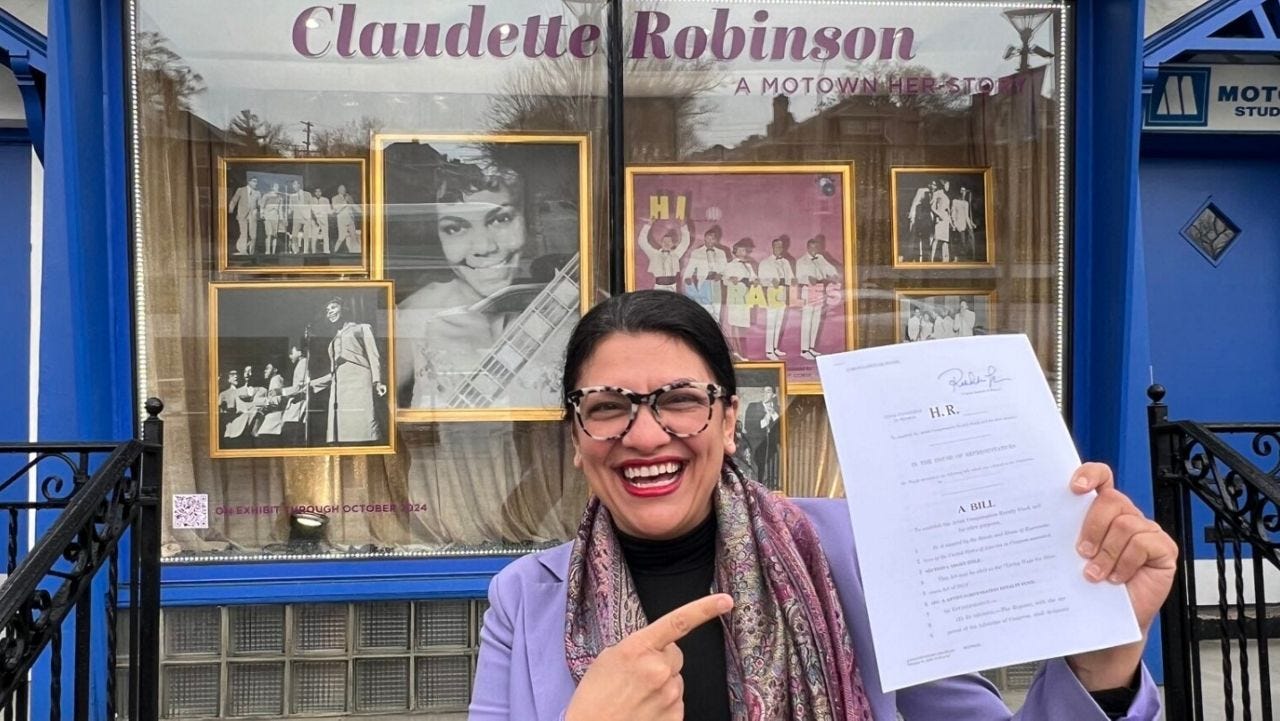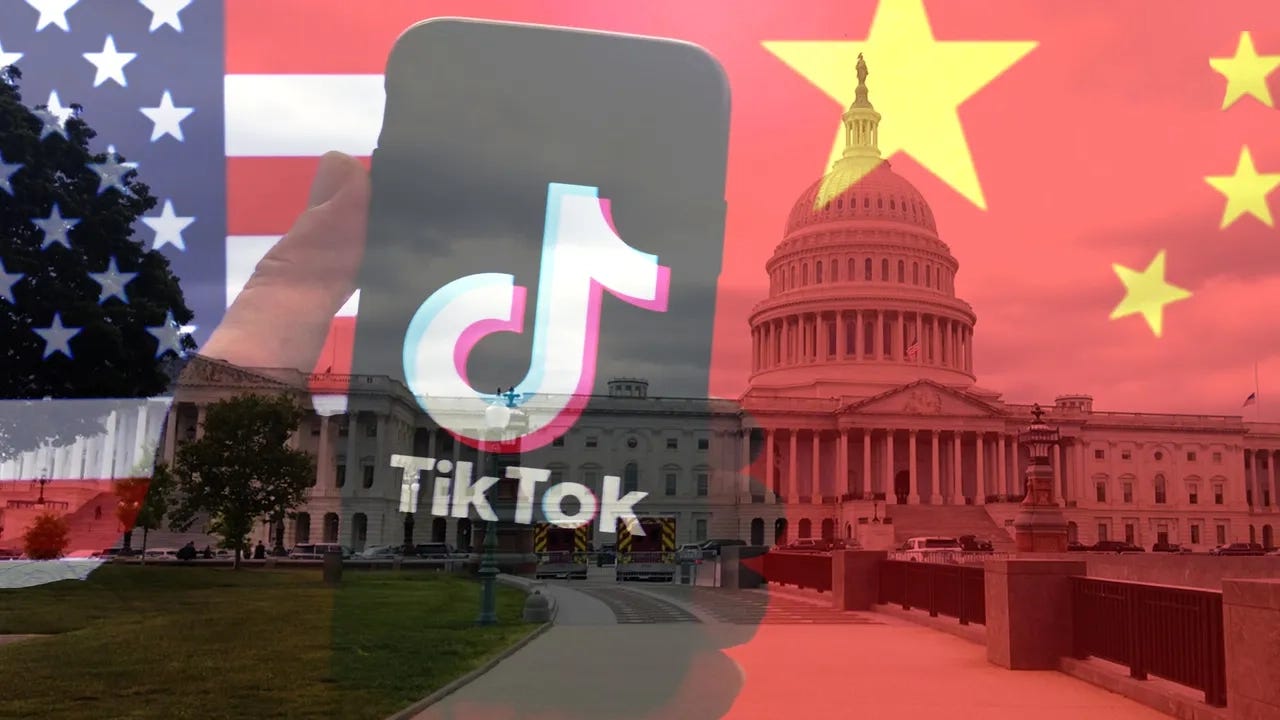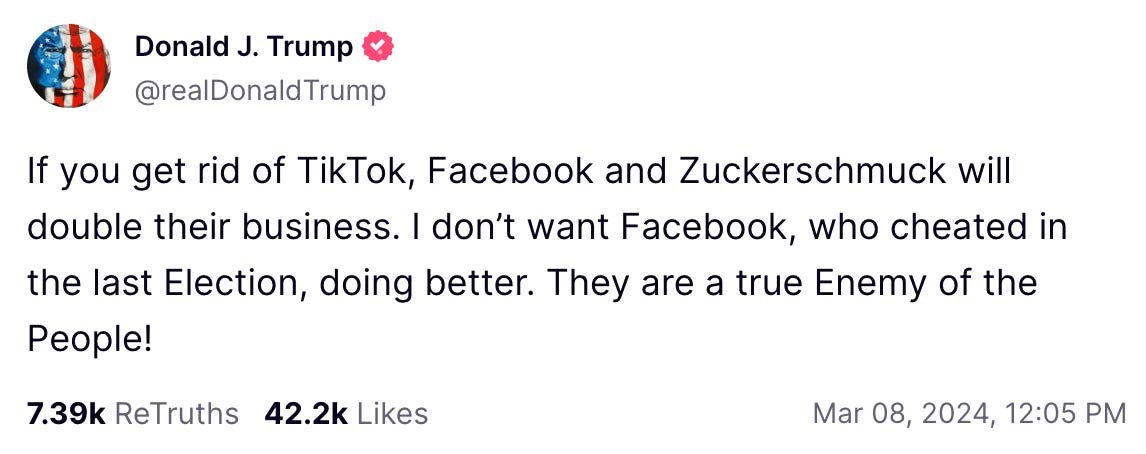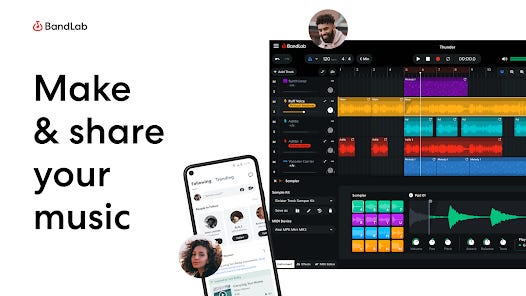The Living Wage for Musicians Act
Representatives Rashida Tlaib and Jamaal Bowman introduced the proposed bill, which would increase artists' royalties to one cent per stream.
Let’s get into the details:
The fund, which would be paid out in addition to the current streaming royalty model, would be fed in part by a proposed 50% fee on every subscription.Do you want piracy? Because this is how you drive people to piracy.
The bill would also establish a royalty cap for tracks that generate at least 1 million streams per month, royalties generated by the tracks beyond that number to be divided among all artists.While this sounds like it only affects the biggest artists, we don't know the monthly payments on 1M streams since they all have opaque structures. Some artists report that a million streams only result in $3,000. This bill would cap the maximum you can earn off your work per month. And, of course, it's taxable.
And then, who does the remainder get distributed to? All artists.
This is akin to universal income ... the shittiest 12-year-old mumble rapper gets free income alongside hard-working musicians. Pro Tip: Create as many artist personas under separate legal entities as you want and flood the services to get more of this shared revenue.
Music is a very optional expense for most people, and if they're working overtime and still struggling, it's not gonna be high on their priorities — especially if you hit them with a 50% surcharge every month. Rising costs are why video piracy is skyrocketing like it’s the early 2000s again.
This may not be a popular opinion, but we must also thin the herd of artists entering the industry. Labels played a crucial role in telling artists they weren't good enough to make a living. Now that everybody circumvents the system, people spend way too much time and money only to learn something a professional would've told them decades before. Streaming services must vet artists on their platforms to prevent bloat (among other issues). We need gatekeepers now more than ever.
This will also be unpopular, but most musicians have never made a lot of money, and the pain they’re feeling is shared by all working-class people.
Congress can’t legislate Spotify into paying money that doesn't exist.
Let's be realistic; this is a regressive tax on the user because the labels are sapping 70% of the revenue Spotify pays out. Live Nation is making money, Ticketmaster is making money, and artists are getting fucked. This bill won’t change any of that.
Don't make users pay into another opaque system where the money gets hoovered up by middlemen, and then the payment is a pittance for artists.
Congress Considering TikTok Ban
From the Wall Street Journal:
Legislation that would ban TikTok in the U.S. or force its sale is hurtling toward a vote in the Senate following months of behind-the-scenes efforts on Capitol Hill. The new push caught the service off-guard, ratcheting up interest from possible buyers and raising the possibility that one of the most popular apps in the country could soon be shut down.
Lawmakers have decried TikTok for years, expressing concern that the app’s Beijing-based parent would share data about its users with the Chinese government or lean on TikTok to promote Beijing’s propaganda and shape Americans’ political opinions. But there were countervailing concerns that a forceful move against TikTok would spark a backlash from the millions of users who have embraced the app. Efforts had seemingly stalled until this week, when a new bill passed the House Energy and Commerce Committee 50-0. An effort by TikTok to push users to call their congressional representatives in opposition to the bill appeared to backfire by only hardening proponents’ resolve.
The bill caught TikTok by surprise. The company, which says it wouldn’t comply with an order from the Chinese government if asked for data and has never been asked, had been tracking the legislation. But internally, leaders didn’t expect it to gain so much traction so quickly, people familiar with the matter said. Having cleared the committee, the bill is set to get a vote in the full House on Wednesday, and lawmakers and people close to TikTok expect the House to approve the bill. If it passes, it will then head to the Senate.Some specific points about the bill in question:
The bill targets app stores and Internet hosting providers, which are prohibited from “distribut[ing], maintain[ing], or updat[ing]…a foreign adversary controlled application.”
The prohibition no longer applies if the application is divested.
“Controlled by a foreign adversary” means the principal place of business is in a “foreign adversary country” or citizens of that country own more than 20%, or the person in charge is “subject to the direction or control of a foreign person or entity” covered by the previous two conditions.
Covered companies provide applications or websites that are social networks (in so many words) with more than 1 million users.
ByteDance is specifically named, but the bill also covers any app that meets the criteria.
Four foreign adversary countries are listed in Title 10, Section 4872(d)(2) of the U.S. Code: North Korea, China, Russia, and Iran.
The President decides if a divesture is qualified.
The bill is pretty straightforward; everything else is, unsurprisingly, pretty complicated.
I wrote this back in late 2020:
It’s not just about censorship, but its inverse: propaganda. Without the constraints of your social network or professional content creators, TikTok's algorithm is free to promote whatever videos it likes, without anyone knowing the difference. TikTok could promote a particular candidate or issue in a particular region, without anyone — except perhaps the candidate, now indebted to a Chinese company — knowing. You may be skeptical this would ever happen, but China has already demonstrated a willingness to censor speech on a platform banned in China; how much of a leap is it to think that a political party committed to ideological dominance will leave a route directly into the hearts and minds of millions of Americans untouched?
Again, this is worth taking China seriously: the CCP has shown through its actions, particularly building and maintaining the Great Firewall at tremendous expense, that it believes in the power of information and ideas. Countless speeches, from Chairman Xi and others, have stated that the Party believes it is in an ideological war with liberalism generally and the U.S. specifically.
It was TikTok itself that made this point, albeit in the most ham-fisted way possible.
From The Verge:
TikTok sent users in the US a push notification on Wednesday, warning that “Congress is planning a total ban of TikTok” that would “[strip] 170 million Americans of their Constitutional right to free expression.” The page says that a ban would “damage millions of businesses, destroy the livelihoods of countless creators across the country, and deny artists an audience.” The alert includes a way for users to find their representative and call their office.This is hardly a new tactic: Uber was famous for launching in cities where the law was unclear, building up a driver and rider base, and then asking them to lobby on Uber’s behalf when city governments reacted to their entrance.
There’s one big difference, though, that I think was articulated well by Lulu Cheng Meservey on X:
There’s one thing I would add to that tweet:
TikTok also lied about the bill.
The bill is not a total ban, and no one is being stripped of their right to free speech: ByteDance can divest TikTok—for a large amount of money—and it will continue to exist as it is; if it doesn’t, there are other social networks like Reels that are ready and willing to give a forum to short-form video enthusiasts.
And those other companies are lobbying hard to make TikTok disappear.
It pains me to post this, but even this guy understands was told that:
As an aside, it’s interesting that Zuckerberg is the focus of Trump’s general dislike and frustration with big tech; I recall Zuckerberg defending Trump’s right to use the company’s platforms, even when those posts were generally just copies of Trump’s Twitter feed. Perhaps Trump, like many in the media, finds it easier to blame the more popular platform he doesn’t use instead of the arguably more damaging one he once preferred (Twitter!).
Regardless, Trump’s about-face was a big surprise, and many couldn’t help but notice that Trump recently made nice with Jeff Yass, who was profiled in the Wall Street Journal last year:
TikTok now has many more friends, with something in common: backing from billionaire financier Jeff Yass. They’ve helped stall attempts to outlaw America’s most-downloaded app. Yass’s investment company, Susquehanna International Group, bet big on TikTok in 2012, buying a stake in parent company ByteDance now measured at about 15%. That translates into a personal stake for Yass of 7% in ByteDance. It is worth roughly $21 billion based on the company’s recent valuation, or much of his $28 billion net worth as gauged by Bloomberg.That certainly is suspicious, to put it gently.
And now…?
There’s still a long road to the ultimate resolution of this saga:
The bill needs to be introduced to and pass the Senate.
President Biden must sign it (the White House has indicated he would).
The bill needs to overcome the inevitable challenge in court and subsequent appeals.
ByteDance needs to divest TikTok; if they don’t, Apple and Google need to remove it from their respective app stores.
Point five is the most speculative, but ByteDance is already posturing that divesting TikTok isn’t viable.
From that Wall Street Journal story:
The legislation calls for Beijing-based parent ByteDance to divest itself of TikTok or face the platform being banned from app stores and web-hosting services in the U.S. ByteDance would have a little more than five months from the enactment of the bill to comply. TikTok, which is accessed by more than 170 million Americans, sees this as an effective ban, said a spokeswoman. The company says separating the U.S. portion of its app wouldn’t be practical and would undercut the appeal of the content app, which is global in nature.This posturing makes political sense, particularly regarding support for TikTok (and justifying the misrepresentation I noted above); I also don’t buy it as a practical matter. To the extent TikTok is intertwined with ByteDance’s core applications, it is the extent to which ByteDance’s core applications can be a part of a divesture. The reality is that TikTok’s — or ByteDance’s — value doesn’t come from its code but from its user base, which provides both supply and demand.
There is also the rather obvious point nobody seems to be talking about: U.S. social networks are banned in China; sure, it’s unfortunate for ByteDance that they have spent so much time and effort building up the TikTok network in the U.S., but the possibility of a ban has always been hanging over the company. To that end, a divesture — again, for what would certainly be a not-insignificant price — seems like a good outcome all things considered; it’s certainly a pragmatic one.
The Chinese government does have the final say in any major ByteDance decisions, above and beyond the right to force ByteDance to give up any data that is demanded; acquiescing to this bill’s demands would be a very strong signal that Chinese pragmatism is still something that can be counted on (this would be a relief to me given the Taiwan question).
On the other hand, if ByteDance refuses to sell, even at the cost of massive amounts of value destruction, that confirms Chinese control and a worrying signal that financial incentives are subservient to ideological ones.
Today (Mar 22nd), senators indicated they’d hold a hearing as the next step in the ongoing saga, which will likely slow down the bill’s momentum.
BandLab surpasses 100 million users
Whenever I see news about BandLab and reach out to friends in bands who may be using it, the response is almost always: “Never heard of it.”
For the unfamiliar, BandLab is an all-in-one music creation, distribution, and services platform that allows artists to make and monetize their music in one place. It also serves as a social media network with users sharing and chatting about tracks. Many of the app’s creation tools are free, but users have to pay to get their songs on streaming services and access certain features.
People in the US account for around 30% of BandLab’s users and represent its largest market.
The press release I received said, “BandLab has seen many of its users go viral and get signed to major labels.” I could only find one: d4vd, an artist who broke through to the Billboard Hot 100 in 2022 with his song Romantic Homicide, a track he created in the app. He signed to Universal Music Group NV’s Interscope/Darkroom label that same year. But that lone instance was two years ago, so.. yeah.
VR Concerts
Led by Meta Quest, Wave, Fortnite, and AmazeVR, the VR concert industry already has roped in top artists like John Legend, The Weeknd, and Blackpink and shows no signs of slowing. Expect Apple to try to boost Vision Pro sales by announcing exclusive performances on Apple TV that can only be fully experienced in extended reality.
Digital box seats
Even as COVID fades into the rearview, VR concerts are here to stay, innovating…
Festivals. Meta Quest put on the Music Valley concert series in Horizon World, featuring artists like Jack Harlow and Doja Cat.
Tours. AmazeVR launched the first VR tour in support of Megan Thee Stallion — playing in select theaters in cities across the US, with shows selling out at fifteen stops.
Merch sales. Travis Scott’s “Astronomical” performance in Fortnite raked in about $20 million, with a significant portion coming from selling branded in-game items.
Virtual artists. Wave put on a concert by Teflon Sega — a mysterious artist who’s gone viral despite only appearing as an avatar.
VR shows have mostly been used as a novel marketing tool to support a tour or album drop. But as the tech improves and becomes more interactive, it may prove to be its own thing entirely — a new gamified, entertainment platform that unlocks the creativity of artists.
Liquid Death
While not music, Liquid Death is inescapable if you work in certain music industry sectors.
The company made a splash last week with a $67 million funding round that brought its valuation to $1.4 billion— double what it achieved 2 years ago, giving the startup coveted unicorn status.
Investors backing the deal include Live Nation, which has helped supercharge growth thanks to an exclusive supply deal that crowbars this terrible-tasting water into all LN venues and onto many of their tours. The water brand is now stocked at more than 110,000 outlets across the US and UK and recorded $263 million in scanned retail sales last year.
Canned Laughs
Liquid Death’s appeal appears to derive in part from its dark marketing flair. The company lists products like "Grim Leafer" and "Berry It Alive" under its tagline, “Murder your thirst.”
At a time when other water brands went minimalist, Liquid Death leaned into a tongue-in-cheek metal morbidity that has paid off on social media, particularly with the increasingly sober Gen Z. Viral pranks and celebrity collaborations such as a Steve-O voodoo doll have helped amass more than 8 million followers across its platforms, including some 5 million on TikTok alone — more than quadruple the total for Evian, the next most followed water brand.
Side Note: People follow water brands? 😐
Next time you aren’t sure your business idea is radical or innovative enough: Liquid Death is worth more than $1 billion, and they just sell crappy canned water.
THE NEWS DESK
Music, Media, & Entertainment
James Blake is the first musician to join the new streaming platform Vault.fm — where fans can listen to his unreleased tunes for $5/month.
Read More → hypebeastGen Z are more likely than older generations to say their favorite movies, musicians, and video games influence how they see themselves.
Read More → adweekGlobal music revenue hit $28.6B in 2023, a 10% rise from 2022 and the highest sales figure since 1999, unadjusted for inflation.
Read More → billboardSpotify launched a new feature on desktop called the Spotify Desktop Miniplayer, which allows paid users to open up a mini Spotify window to control playback and watch video podcasts while using other apps and windows.
Read More → spotifyMrBeast, YouTube's kingpin, is set to host a new show on Amazon Prime with the largest prize in television history: $5 million for the winner.
Read More → variety"Taylor Swift: The Eras Tour" becomes Disney+'s most-streamed music film three days after its release on the streaming service.
Read More → variety
Fashion & E-Commerce
Selena Gomez is looking to sell her Rare Beauty cosmetics brand, which has a very pretty valuation of $2 billion. Read More → bloomberg
TikTok announced new ad formats for TikTok Shop, including shoppable video ads and a new ad format for the designated Shop tab. The announcements show how TikTok is doubling down on its business goals even amid the threat of a ban.
Read More → tiktokParis Hilton sold nearly 500k Roblox emotes in two months. I don’t know what the hell that means, but know it generated $620k in revenue.
Read More → musically
Tech, Web3, & AI
Truth Social Merger: Shareholders are expected to vote today on whether to merge publicly traded shell company Digital World Acquisition with Trump Media, the owner of the Truth Social platform. If approved, Trump Media could go public next week, doubling Trump's $2.6B net worth.
Read More → apReddit ended its first day on the public markets up 48% from its offering price. The IPO “pop” was bigger than Snap’s in 2017 and Pinterest’s in 2019.
Read More → reutersPulitzer Prize announced that five of its 45 finalists used AI for their submissions
Read More → niemanlab
Misc
Millennials will become the richest generation in history, with boomers expected to pass down $90 trillion of assets over the next two decades.
Read More → yahoo financeGen Alpha texts their parents to help them during class. sigh.
Read More → slateBuckingham Palace is looking for a new communications assistant.
Read More → brainfloss
Deep Reads
Kissing Cousins
The widespread collection of genetic data via consumer ancestry products has revealed an unsettling reality—People are discovering the truth about their relatives—and learning that incest is far more common than many think.
Read More → atlanticManaged by Mom and Stalked by Men
Parents seeking social media fame for their underage daughters can expose them to a disturbing online reality, where sex offenders can pay to see more. These parents are disgusting.
Read More → nytHow Apple Sank $1 Billion a Year Into a Car It Never Built
Tim Cook shut down plans to acquire Tesla before cycling through a junkyard’s worth of self-driving designs over the past decade. The inside story is a case study of indecision.
Read More → bloomberg


















Well said on that ridiculous Rashida Tlaib idea.